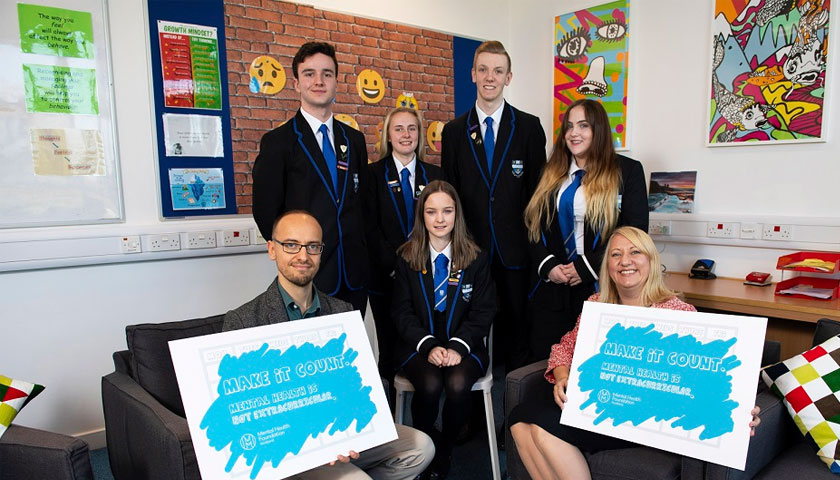Pupils, teachers and parents from Kirkintilloch High School in East Dunbartonshire helped launch the new ‘#Make it Count’ campaign from the Mental Health Foundation Scotland. Launching on World Mental Health Day, the new campaign calls for the Scottish Government to tackle the growing mental health crisis in schools, after new figures published today revealed a quarter of Scottish parents say academic pressure is causing their children to feel stressed.
Kirkintilloch High School has been chosen to launch the campaign, due to its proactive approach to mental health and wellbeing, which demonstrates the positive impact that the right support can make in preventing mental health problems.
The High School, which has almost 600 pupils, has worked hard to develop a culture based on nurture principles with staff undertaking significant training to improve their awareness. There is also a dedicated wellbeing team and pupils are all familiar with the support available and are actively encouraged to seek help if they are experiencing difficulties.
The new education campaign highlights the growing mental health crisis in children and young people across Scotland, with fast rising rates of depression, anxiety and self-harm. The charity is now calling on people across Scotland to back the new campaign and sign a petition to ensure that mental health and wellbeing is not extra-curricular, with a call for all teachers trained in mental health, and wellbeing taken as seriously as literacy and numeracy.
Maureen Daniel, Head Teacher at Kirkintilloch High School said: “It was an honour to host the launch of the ‘Make it Count’ campaign at Kirkintilloch High School as we pride ourselves on being a school where young people can access mental health and wellbeing support and be comfortable in doing so. We are always working to build on the excellent work of the Pupil Support Team to embrace opportunities to improve the support we provide our young people to ensure that our school remains a positive nurturing environment for everyone who attends.”
East Dunbartonshire Council’s Education Convener, Councillor Jim Goodall, added: “As well as training support for staff, the school has established a number of support groups for pupils who may be experiencing difficulties in their lives. This includes an alternative learning environment for pupils who may require a period out with the traditional learning setting, a breakfast club, an LGBT group, a dedicated Counsellor and a programme tailored for pupils who have experienced significant change or loss. These reflect the very high priority the school attaches to the wellbeing of all of its pupils.”
The Mental Health Foundation Scotland is asking the Scottish government and schools to take five key steps to help ‘Make it Count’:
- All teachers in Scotland to be trained in mental health and adolescent brain development by 2020.
- All schools in Scotland to measure levels of wellbeing by introducing a “wellbeing questionnaire” once a term to identify problems early by 2020.
- The Scottish Government to introduce a new national target of one hour of quality Personal and Social Education per week with a minimum of 50% of those classes dedicated to building emotional resilience and tackling the root causes of mental ill health by 2020.
- Every school to adopt a peer-led mental health programme by 2020 to help young people support one another and break down the stigma on mental ill health.
- Mental health support workers to be embedded in every school by 2020 so that young people who require targeted support receive it, when they need it, in environments they trust.
Toni Giugliano, Policy Manager at the Mental Health Foundation Scotland said: “Our research shows that academic pressure is exacerbating many young people’s mental health. The Scottish Government’s focus on raising attainment in reading and writing must not be at the expense of young people’s mental health.
“It’s unacceptable that teachers are still not trained in mental health in Scotland. School staff desperately want the training to explore the “real life issues” that create distress – be it body image, relationship worries, exam stress or how to handle difficult conversations on social media.
“Mental ill health is on the rise and schools must be equipped to respond and prevent distress by helping young people build resilience and cope with difficult situations. Unless we do that we’ll continue to see more children in crisis.
“We welcome the commitment to train teachers in Mental Health First Aid – but we shouldn’t be waiting for children to become unwell before teachers are able to assist them. All school staff should be trained in much broader mental health and resilience to prevent mental ill health from developing in the first place.
“Unless we take action now we will fail the next generation right at the start of their lives.”



